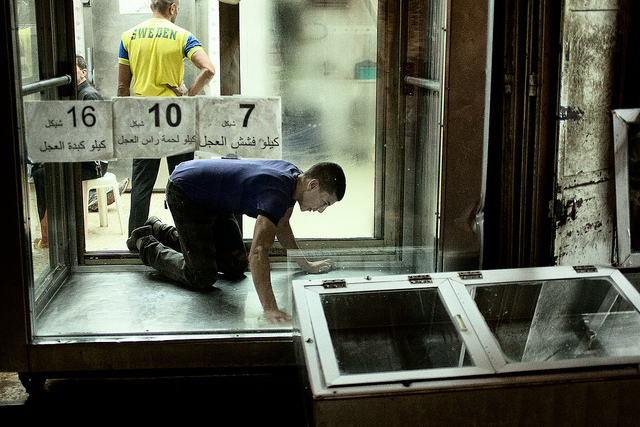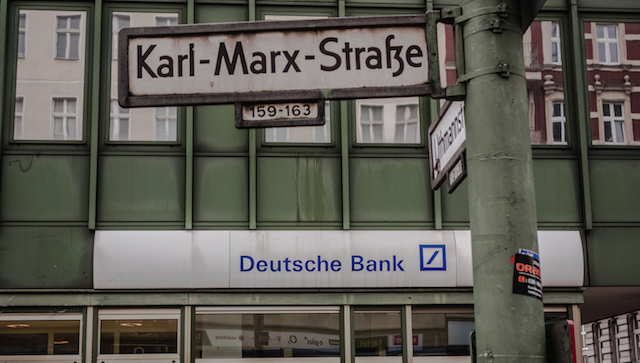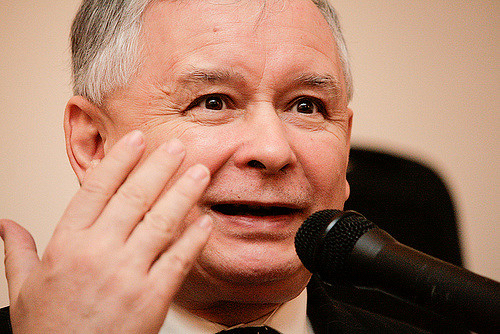Poland faces a powerful Catholic right promoting a “moral revolution” (rewolucja moralna.) These same conservatives were in power between 2005 and 2007, and may return to government in the coming elections. By the end of the Law and Justice government in 2007, the nationalistic “Poland for the Polish” of this morality was clear. Shortly before his death in January 2006, Stanislaw Lem wrote: “The Kaczynski brothers, at least Jaroslaw, will fail – I am afraid – due to his greed for power.” Filmmaker Agnieszka Holland was critical of the government, mentioning in particular the homophobia of rightwing politician Roman Giertych. Adam Michnik, the leading dissident under communism, and editor-in-chief of Poland’s main newspaper Gazeta Wyborcza, wrote in The New York Review of Books about a “moral revolution” in Poland: indeed, the period was filled with suspicions, accusations, scapegoating, and hatred. In The Economist, Edward Lucas called the then-government “fractious, pig-headed” and “[vengeful], paranoid, addicted to crises, divided and mostly incompetent.”
In previous essays, we discussed the dangerous misogynism, homophobia and anti-Semitism within the League of Polish Families, which in 2005 joined the Law and Justice Party (PiS)-led government. In The Populist Radical Right in Poland: the Patriots, Rafal Pankowski pursues a similar analysis of the extremists, including skinheads, who entered the ruling coalition in Poland. The rightward drift of Polish society is worrying to Europe’s political classes. For example, in his review of Pankowski’s book, Richard Howitt, a British Labour Party MEP, warns against the extremism of Poland’s right. If this tendency disturbs the European intelligentsia, however, its presence is not new.
The Polish right’s demand for a moral reformation has been on the table for a long time. In the conservative Catholic imaginary, modernity is always a source of corruption requiring suppression. Responding to such political demands, in a 2006 essay, Art versus the Moral Revolution, Pawel Leszkowicz wrote “A specter is haunting Poland, a specter of the moral revolution. In a country which didn’t know a real revolution in mores, there are calls for the necessity of a moral revolution. What would such a revolution be concerned with in this conservative country? Haven’t we had enough? The emerging regime of moral revolution is to deal with freedom in mores and culture. That is why these spheres — freedom and culture — become priceless.” Leszkowicz’s call for resistance forces us to carefully consider our actions. How do we create a democratic counterculture? Gays and women are natural targets for moral crusaders, so cultures of rebellion inevitably emerge within their ranks.
To help foster such resistance, the University of Warsaw and the Polish Academy of Sciences hosted a conference to critique the Fourth Republic Project. The gathering was inspired by Victor Klemperer’s Lingua Tertii Imperii and sponsored by Professor Michal Glowinski, an outstanding literary theorist and Holocaust survivor who recently came out as gay in his autobiography The Circles of Strangeness. Glowinski is one of the few intellectuals who oppose the moral reformists. Alongside him at the Academy sat Professor Maria Janion, senior literary historian and chronicler of Polish anti-Semitism. Yet at the same Academy, literary critic Jaroslaw Marek Rymkiewicz supports the imposition of a new moral code, suspecting a new foreign carving-up (rozbiór) of Poland, such as that which partitioned the country in the 18th century. It is this desire to uncover a plot to subdue Poland to an alien power that joins intellectuals like Rymkiewicz with typically paranoid American conservatives, who similarly regard demands for civil liberties and social equality as subversive.
Such views, informed by religious dictates, sanctify oppression and resist rationalism. Society is at ‘risk’ because it defies divine ordinances, not because it denies freedom and equality. Thus, to invoke the US example again, Texas Governor Rick Perry claims that economic principles should be based on the Bible. Failure to do so makes citizens into slaves of the government. Counter-arguments will fail because the discourse is anti-intellectual and anti-rational. To follow another route than Christian faith – as both Poland’s Catholic hierarchy and evangelical Protestant minister James Robison would agree (despite despising each other) – is the road of deception. There can be no civil intellectual discourse because, in Robison’s claim, “those who worship the power of the state and interpret equality and individual rights as coming from government rather than from God will always work to diminish individual freedoms.” The truths of rightwing Christianity serve as the only acceptable foundation for achieving a just society. Although American-style evangelical Protestantism and Polish Catholicism stand at a remove from each other, they share this political outlook. Rejection of the oppression created by religion, in their view, is slavery created by sin.
After 2010’s Smolensk catastrophe, in which Polish President Lech Kaczynski, and 95 other passengers were killed, Jaroslaw Marek Rymkiewicz sent a poem to conservative broadsheet Rzeczpospolita, written in the Polish tradition of a thirteen syllable national epic: Ojczyzna jest w potrzebie – to znaczy: Å‚ajdacy/Znów wziÄ™li siÄ™ do swojej odwiecznej tu pracy (“The fatherland is in need – which means: scoundrels/ again took up their eternal work here” – a syntactically clumsy but adequate translation.) In the emphatic “here” scoundrels have always worked – the patrie in peril! A new moral code will save it! In a subsequent interview, Rymkiewicz claimed that Poland is divided into two nations, one of “patriots” and the other of “collaborators.” Rymkiewicz inveighs against the editors of Gazeta Wyborcza with anti-Semitic undertones, calling them “the spiritual heirs of the Polish Communist Party,” stating that they “wish Poles would finally stop being Poles.” Sound familiar? Perhaps a revision of this statement is in order. Perhaps the problem isn’t so much that Poles want to be someone else, as much as they just can’t stop being right-wingers. There’s no other way to secularize it.
Photograph courtesy of Thierry Ehrmann. Published under a Creative Commons license.






Bullshit doesn’t even begin to describe this article. Biased is what I would call it if I were formal, but it’s just pathetic.
Why RDHRDHRD? Explain, please, or you’re answer could also be called bullshit.
Name-calling is what happens when you do not have an argument.
I have spent a lot of time just south of the Polish border in Moravia. I wonder how Poland’s moral revolution will spread as I am guessing that like Moravia and the Czech Republic, the vast majority of staunch Catholics in Poland are over 60 years old. Those who had childhoods before 1989 in many cases had no church to attend and to learn all the critical foundation stories necessary to rally major numbers of supporters today for the moral revolution. I also wonder what kind of Vatican resources are being used for this effort since much of western Europe is more focused on righting past Church-based child abuse cases than supporting new Church-based movements.
The Cesky Tesin area is heavily mixed with a substantial Polish presence. I have walked through that area many times, and a few of my students in Olomouc were training as teachers for the Polish-language high school there. But as one travels into Moravia, Polish-style Catholicism thins. The Czechs make it a point of national pride that their version of Catholicism is more tolerant than in Poland, and the Church has far less influence in Czech politics. So I doubt that the Polish ‘moral revolution’ is too portable in this direction. The Czechs have their own, more secular version of right-wing politics.
I agree with you, Joe. My wife is Moravian, and the word “atheist” is the most apposite to describe her, her family and friends. Moravia isn’t as Godless as Estonia by a long shot, but Poland it ain’t.